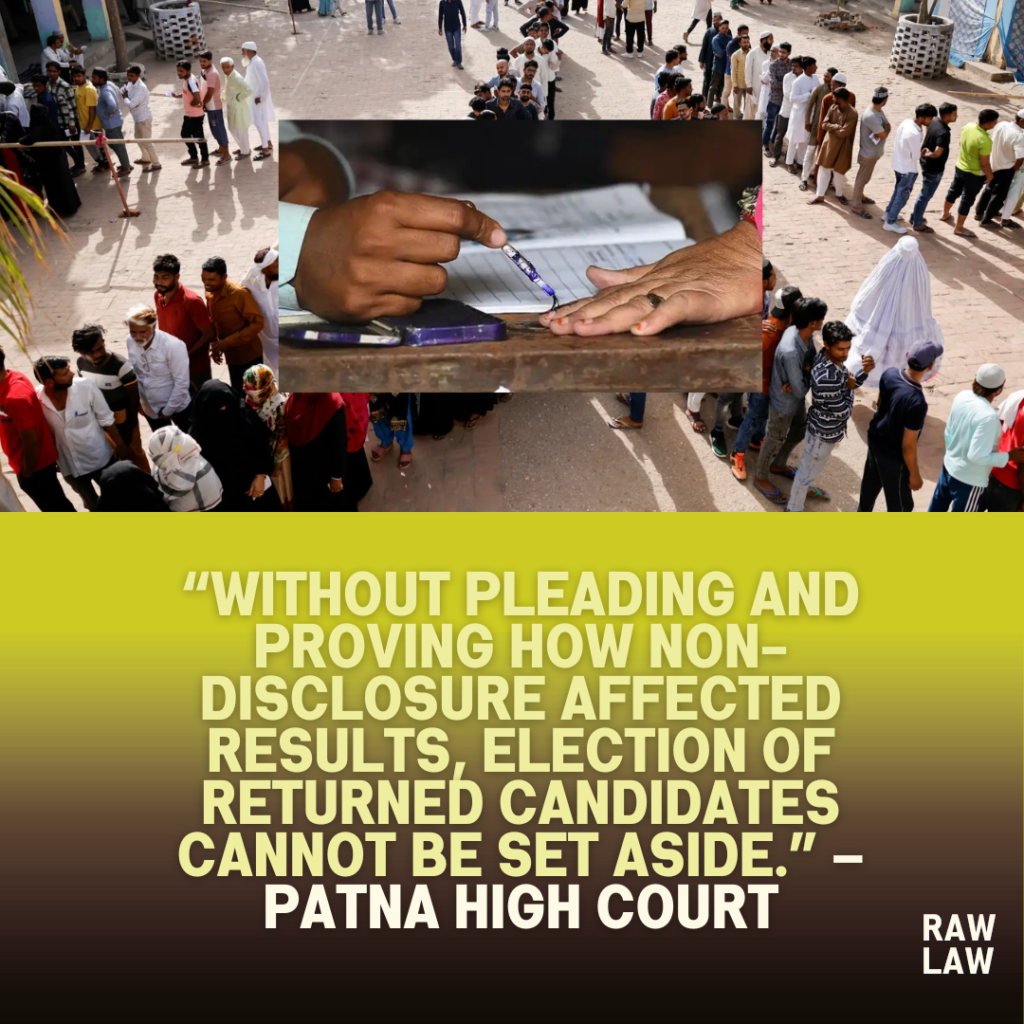Court’s Decision
The Patna High Court allowed the writ petition, set aside the Election Tribunal’s order removing the petitioner from the post of Mukhiya, and restored her election. The Court held that under the Bihar Panchayat Raj Act, 2006, non-joinder of necessary parties and absence of pleading regarding the material impact of non-disclosure on election results are jurisdictional defects rendering the election petition invalid. It further held that non-disclosure in nomination affidavits does not constitute “corrupt practices” unless pleaded and proved.
Facts
The petitioner was elected as Mukhiya of Gram Panchayat Raj, Khadaich, in a Scheduled Caste Female reserved constituency, polling held on 24.11.2021, counting on 26.11.2021, and result declared the same day. The first respondent, who lost, filed an election petition under Sections 137 and 139 of the Bihar Panchayat Raj Act before the Election Tribunal, Jamui, alleging the petitioner failed to disclose pending criminal proceedings and certain asset details in her nomination affidavit under Section 125(a). Initially, the election petition did not include all contesting candidates nor seek a declaration for the petitioner’s election. After limitation expired, amendments were sought to add parties, new facts, and prayers, which the Tribunal allowed, eventually setting aside the petitioner’s election and declaring the first respondent elected.
Issues
- Whether an election petition without joining all necessary parties within limitation is maintainable.
- Whether non-disclosure of criminal cases and asset details amounts to “corrupt practices.”
- Whether the election could be set aside without pleading and proving that non-disclosure materially affected the election result.
Petitioner’s Arguments
The petitioner argued that:
- The election petition was barred by limitation, and mandatory parties were not joined within the prescribed 30-day limit under Section 137, rendering it incompetent.
- Amendments after limitation adding parties, facts, and prayers were impermissible.
- Non-disclosure of pending criminal cases or asset details does not amount to “corrupt practices” under Section 141.
- No pleading or evidence was provided showing the material impact of the alleged non-disclosure on election results, violating the statutory requirements under Section 139.
- Relied on Neelam Kumari (2008), Kameshwar Singh (2009), Roji Kumari (2009), Karim Uddin Bharbuiya (2024), Mangni Lal Mandal (2012), and Karikho Kri (2014) to argue jurisdictional defects are fatal.
Respondent’s Arguments
The private respondent argued:
- The election petition was filed within limitation, and COVID-19 exclusions extended the limitation period.
- Amendments adding necessary parties and prayers were valid under Order VI Rule 17 CPC.
- Non-disclosure violated Sections 125(a) and Rule 39(f), making the acceptance of the petitioner’s nomination improper.
- The Election Tribunal rightly set aside the election and declared the respondent elected.
- Relied on Reham Sah v. Govind Singh (2024) where the Supreme Court extended limitation due to the pandemic.
Analysis of the Law
The Court examined:
- Section 137(2) of the Bihar Panchayat Raj Act and Rule 106(2) requiring mandatory joinder of all contesting candidates if a declaration is sought, within 30 days.
- The bar on amendments post-limitation that seek to cure jurisdictional defects.
- The definition of “corrupt practices” under Section 141, noting non-disclosure in affidavits does not constitute corrupt practice without clear pleading and proof.
- Requirement under Section 139 that material impact on election results must be pleaded and proved for interference with results.
- Precedents clarifying mandatory statutory requirements in election petitions are jurisdictional and non-compliance is fatal.
Precedent Analysis
- Neelam Kumari v. State of Bihar (2008)
Held that mandatory joinder of parties in election petitions within limitation is jurisdictional.
- Karim Uddin Bharbuiya v. Animul Haque Laskar (2024 SC)
Non-disclosure in affidavits is not corrupt practice unless pleaded and proved with material facts.
- Mangni Lal Mandal v. Bishnu Deo Bhandari (2012 SC) and Karikho Kri v. Nuney Tayang (2014 SC)
Pleadings must specifically state how the result was materially affected to sustain an election challenge.
- Reham Sah v. Govind Singh (2024 SC)
COVID-19 period excluded for limitation computation but did not override jurisdictional defects.
Court’s Reasoning
The Court held:
- Mandatory parties were not joined within limitation; amendments post-limitation cannot cure jurisdictional defects.
- Non-disclosure of pending cases and assets does not constitute corrupt practice under Section 141 without pleading and proof.
- The election tribunal erred in setting aside the election without evidence of material impact on election results due to alleged non-disclosure.
- The tribunal wrongly declared the respondent elected without complying with Section 140 requirements.
Conclusion
The Patna High Court allowed the writ petition, set aside the Election Tribunal’s order, and restored the petitioner as Mukhiya. It held that:
“Non-joinder of mandatory parties and lack of pleading on material impact render the election petition incompetent.”
No costs were imposed.
Implications
- Clarifies strict procedural compliance under election law is mandatory.
- Confirms non-disclosure in affidavits does not automatically invalidate elections unless material impact is proved.
- Reinforces that jurisdictional defects in election petitions cannot be cured by amendments post-limitation.
Referred Cases and Their Relevance
- Neelam Kumari (2008), Kameshwar Singh (2009), Roji Kumari (2009): Mandatory joinder of parties within limitation is jurisdictional.
- Karim Uddin Bharbuiya (2024 SC): Non-disclosure in affidavits does not amount to corrupt practice unless pleaded and proved.
- Mangni Lal Mandal (2012 SC), Karikho Kri (2014 SC): Absence of pleading on material impact invalidates election challenges.
FAQs
- Can a Panchayat election be set aside for non-disclosure of pending criminal cases?
No, unless it is pleaded and proved that the non-disclosure materially affected the election outcome.
- Is it mandatory to join all contesting candidates in an election petition?
Yes, under the Bihar Panchayat Raj Act, failing to do so within the limitation period renders the petition invalid.
- Does COVID-19 exclusion extend limitation for curing procedural defects in election petitions?
No, while limitation extension applies, jurisdictional defects like non-joinder of mandatory parties cannot be cured post-limitation.



